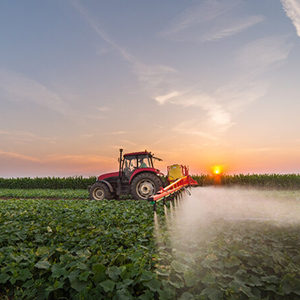
There is an increasingly common problem developing in rural communities. Your neighbor sprays their crops with an herbicide or pesticide and all of the sudden your crops become damaged. What is happening? And more importantly, what remedies do you have? The increase in Dicamba Drift cases is bringing more information to light.
Dicamba is a broad spectrum herbicide first approved in 1967 to kill weeds. It has come back into favor due to resistance in some weeds. Dicamba is prone to drift off target. Although the new dicamba-based herbicides are formulated to stay on the application sites, there are still issues with spreading to other areas and damaging surrounding crops, especially if one farmer uses Dicamba resistant crops, but you don’t.
 Most drift cases between neighbors rely on negligence claims. It can be difficult to prove the causal link. Some states have accepted the concept of res ipsa loquitor which basically says, “my crops were fine, my neighbor applied pesticide, now my crops are damaged, therefore my neighbors chemical application damaged my crops.” And one state has, for a certain strong pesticide, said that its application is automatically assumed to be the cause of damage.
Most drift cases between neighbors rely on negligence claims. It can be difficult to prove the causal link. Some states have accepted the concept of res ipsa loquitor which basically says, “my crops were fine, my neighbor applied pesticide, now my crops are damaged, therefore my neighbors chemical application damaged my crops.” And one state has, for a certain strong pesticide, said that its application is automatically assumed to be the cause of damage.
However, the recent Dicamba Drift litigation is based on product liability. In other words, rather than saying “my neighbor used their pesticide/herbicide wrong causing damage to my crops” you are saying “this company made an inherently bad product that caused damage to my crops when applied by my neighbor.”
If you feel like your crops have been damaged by drift your first step is to report it to the proper state authority. In Kansas, that involves completing the following form
Currently the federal crop insurance program does not cover drift damage. However, if your crops are damaged by something your neighbor does, it is important that you as the owner of damaged crops report the damage to YOUR crop insurance carrier for an uninsured loss adjustment determination. You then have the option to exclude the damaged acres from your actual production history yield calculation.
 Courts recognize that drift, regardless of conditions and care taken, should almost always be expected. To reach the level of negligence it must be shown that the person doing the application did not follow proper processes and that the failure to follow procedures caused the actual damage. Factors that might be important is the type of chemical being used, is it common or more unusual? What were the weather conditions? Was it exceptionally windy? If so, did the applicator account for it, or stop the application? Did the applicator follow the directions on the EPA label? Some states have found certain chemicals so strong that they have determined that applicators are automatically liable for damage to neighboring properties. This theory is more consistent with the current claims against Dicamba which are following a product liability. In other words, claims are being made that manufacturers have created a product so dangerous that they should automatically be responsible for damages to surrounding crops damaged by its use.
Courts recognize that drift, regardless of conditions and care taken, should almost always be expected. To reach the level of negligence it must be shown that the person doing the application did not follow proper processes and that the failure to follow procedures caused the actual damage. Factors that might be important is the type of chemical being used, is it common or more unusual? What were the weather conditions? Was it exceptionally windy? If so, did the applicator account for it, or stop the application? Did the applicator follow the directions on the EPA label? Some states have found certain chemicals so strong that they have determined that applicators are automatically liable for damage to neighboring properties. This theory is more consistent with the current claims against Dicamba which are following a product liability. In other words, claims are being made that manufacturers have created a product so dangerous that they should automatically be responsible for damages to surrounding crops damaged by its use.
If you believe that your property has been damaged by drift, first, file the appropriate state complaint. Titus Law Firm, LLC is happy to help you through this process and to get some compensation for your damaged crops.

Rob Titus is a charismatic Kansas lawyer with over a decade of experience litigating all manner of civil law claims and lawsuits. His succinct and persuasive voice in court translates to clear and easy-to-follow writing for anyone looking for a fundamental understanding of their civil law options and rights.
Connect with the Titus Law Firm to get all the latest on Kansas civil law legal trends and courtroom developments.
Call Us Now To Get Your Case Reviewed (913) 543-4500